To enhance the appearance and functionality of our bathroom effectively requires an exploration of styles of bathroom shower guard available, in the market today. These doors serve a purpose beyond separation—they reflect our unique sense of style and cater to our specific requirements meticulously. Whether opting for the transparency of glass bathroom doors to create a sense of spaciousness or choosing patterned designs, for added privacy and aesthetic appeal—there exists a diverse array of options to suit every individuals preferences and needs seamlessly.
Wanting either the appearance of doors, without frames or the efficiency of sliding doors gives us an understanding of our choices when it comes to glass barn door shower doors for our bathroom design. When it comes to high quality bath glass shower doors in the market today there are options to consider Lets examine each type with HOROW in detail to determine the most suitable one, for our household.
The Popularity of the Type of Glass Shower Door
Shower glass enclosure have gained popularity, in bathrooms among homeowners and designers due, to their design and luxurious ambiance they offer for bathroom remodeling and construction projects.
Aesthetic Appeal
Upgrading to shower with glass can transform the aesthetic of a bathroom effortlessly by offering an refined vibe while showcasing the tile work or luxurious fixtures without any obstructions, in view Whether opting for a clear or textured design the see through quality adds a hint of sophistication and gives the impression of a larger space.
Versatility in Design
Shower doors glass can be customized to suit styles from minimalism to traditional designs They come in framed semi frameless shower door and semi-frameless shower enclosure options that blend seamlessly with different decor and layouts The range of opening mechanisms also makes them suitable, for bathrooms of all sizes.
Reusable and Long-lasting
Glass shower enclosures are designed for durability and longevity using tempered safety rain glass that's resistant to breakage and can endure usage without any issues arising from wear and tear over time Their non porous nature ensures better hygiene levels and reusability when compared to the conventional types of shower curtains for walk in showers typically used in bathrooms.
Growing Availability and Affordability
The increasing demand, for glass shower doors has led to an expansion in the market offerings and improved pricing options for homeowners seeking quality products at prices and with a range of customization choices available, than ever before.

What kind of glass is best for a shower?
Pick the shower glass can not just look good, privacy, durable, transparent, and good cleaning must be considered, you have to find the best balance in these aspects. Now on the market a variety of glass shower door, figure out the real performance of each glass in the bathroom, in order not to step on the pit.
Whether you're looking to upgrade your bathroom or install a new shower, this guide will help you pick out glass that's practical and looks good. Next, we'll take a look at a few common shower glass doors and see what they have to offer.
Low-iron glass (ultra-clear)
- Ideal for modern, well-lit bathrooms
- Often referred to as ultra-clear or crystal glass, low-iron glass is prized for its virtually colorless appearance. While standard clear glass has a subtle greenish color due to its high iron content, low-iron glass removes most of the iron, resulting in a cleaner, brighter surface.
Key Benefits
- Maximizes light transmission for a bright, airy shower space
- Makes small bathrooms feel larger and more open
- Easily matches minimalist or contemporary design
- Easy to clean with standard glass cleaners
Cautions
- High transparency, low privacy
- Typically more expensive than standard glass
- If you want spa-like spaciousness from your shower glass, then this is the one for you.
Textured glass (frosted, raindrop, hammered)
Best for Both privacy and design, textured glass is popular in showers because it provides privacy while allowing light into the shower. It is available in a variety of finishes, each offering a different balance of privacy and style:
- Frosted glass: acid-etched or sandblasted to create a uniform opaque surface
- Raindrop glass: Raindrop texture on one side for a soft, decorative look
- Hammered glass: Wavy irregular pattern with blue or gray tones
Key Benefits
- Enhances privacy while letting in light at the same time
- Adds visual interest and texture to the bathroom
- Conceals water spots, smudges and fingerprints better than clear glass
Cautions
- Frosted glass may be more difficult to clean due to its porous surface
- Certain textures may reduce the openness of the space
- Textured glass doors for showers are ideal for shared bathrooms or master suites where style and concealment are equally important.
Annealed glass (float glass)
Ideal for cost-effective projects and low-traffic bathrooms, annealed glass, also known as float glass or soda-lime glass, is the standard clear glass used before tempering. It is smooth, flat, and affordable, making it the preferred choice for renovation projects with limited budgets or glass shower enclosures that don't require additional durability.
Key Benefits
- Economical choice for guest bathrooms or rental properties
- Customizable size, color and opacity
- Good optical clarity and versatility
Cautions
- Not safety glass - sharp shards form when broken
- Not as strong or durable as tempered or laminated glass
- While annealed shower glass is not typically used in frameless doors for safety reasons, it is still suitable for certain framed designs or panel partitions with minimal risk.
When choosing enclosure shower glass, consider your home's needs, safety preferences, design goals, and the level of maintenance you are comfortable with. For a bright, modern look, choose low-iron glass. For privacy without sacrificing style, choose textured glass. Annealed glass is also a good option for projects on a budget, but be sure to weigh the safety risks.

Different Styles Of Glass Shower Doors
Deciding on the glass small shower door can be quite a challenge. Lets dive into the different choices available and discover the ideal match for our bathroom spaces.
Frameless Glass Shower Doors
Frameless types of glass shower doors utilize glass and minimal hardware for an appearance ideal, for contemporary bathrooms.They are simple to clean and upkeep. Tend to come with a price tag due, to their design features.
Semi-Frameless Shower Doors
Semi-frameless types of glass shower doors blend both aesthetics with a surrounding frame, for the structure but not the door itself striking a balance, between style and stability while being budget friendly.
Framed Doors
Framed types of glass shower doors are an option that feature metal frames to uphold glass panels in place, for stability and aesthetics in your bathroom design scheme.
Sliding Shower Doors (Bypass Doors)
Sliding types of glass shower doors are a choice, for bathrooms as they glide smoothly along tracks without needing extra space to open up. They are commonly used in combined tub shower setups or cozy enclosures.
Pivot Doors
These pivot types of glass shower doors open and close, like regular doors do – they can swing in or out depending the space which makes them ideal for spacious bathrooms, with enough room to spare.They bring a touch of luxury. Are commonly found in frameless styles.
Bi-Fold Shower Doors
Bi fold types of glass shower doors fold inward to save space while still providing access. For small bathrooms where a sliding or swinging door won't work well.
Neo-Angle Shower Doors
Neo angle types of glass shower doors are specifically crafted for corner setups. Utilize three glass panels to form a diamond fusion shaped enclosure that not conserves space effectively but also provides a distinctive and modern aesthetic appeal.
Frosted and Textured Glass Options
If you appreciate privacy concerns and desire a touch of elegance in your space consider using textured glass to enhance style and obscure visibility. These choices not help minimize water spots but also reduce the appearance of fingerprints making maintenance a task.

How Does Glass Thickness Impact Your Shower Door?
The thickness of the glass in your shower enclosure plays a crucial role in determining not only the durability and safety of your shower door, but also the sturdiness and quality of your shower door when it opens and closes. Choosing the right thickness is critical to the reliability and longevity of your shower enclosure. Below is a breakdown of common glass thicknesses and what they mean for your bathroom:
1/4-inch (6 mm) Glass
This thickness of glass is commonly used for framed shower doors, mirrors and small glass shelves. Because of its relative thinness, 1/4-inch glass relies heavily on metal framing to provide stiffness and structural support. By itself, this glass is quite flexible and not very strong, so it is generally not recommended for frameless shower doors. In frameless installations, 1/4-inch glass may give the appearance of being unstable and will rock when the door is moved, compromising the aesthetics and safety of the shower.
5/16-inch (8 mm) Glass
Slightly thicker than 1/4-inch, 5/16-inch glass is commonly used in shower sliding doors and many store-bought shower systems. The lighter weight of this glass helps reduce transportation and installation costs. In framed or semi-frameless shower systems, glass doors of this thickness supported by tracks or framing can work well, but for fully frameless shower doors, this thickness of glass may not provide enough rigidity and may cause movement or instability over time.
3/8-inch (10 mm) Glass
By far the most popular choice for frameless shower doors, 3/8-inch glass offers the perfect balance of durability, security, and elegance. This thickness is thick enough to provide excellent rigidity and stability, giving a sturdy, high-quality feel without being overly heavy. Most frameless shower door hardware is designed to support glass panels of this thickness, making it a reliable and versatile option for bathrooms of all sizes and styles. You'll find that 3/8-inch glass minimizes flexing and wobbling, which enhances the function and appearance of your shower.
1/2-inch (12 mm) glass
For larger custom showers, or spaces with tall or wide glass panels, 1/2-inch glass is the top choice. This thicker glass is super hard and resistant to bending or bowing, which is important in wide shower designs where thinner glass may feel unsafe or visibly bend. Due to the added weight, 1/2-inch glass requires heavy-duty frameless hardware to support the additional load. Additionally, 1/2-inch glass has a distinctly heavy and premium feel, and its sturdy appearance and luxurious texture are loved by many homeowners. Even in smaller spaces, some choose 1/2-inch glass for a heavier, more high-end look.
Tips for Selecting the Right Shower Door
Selecting the best shower door holds significance as it enhances the bathroom aesthetics and functionality. To begin with this process Evaluate Your Bathroom Area by measuring the space and considering the layout to ensure a fit of the type of door or glass for shower doors.
![]() Assess Your Bathroom Space
Assess Your Bathroom Space
When selecting a glass shower door between different types of glass shower for your bathroom it's important to begin by measuring the space. Take into account the floor area, ceiling height and the clearance needed for door swing or sliding mechanisms. In tight bathrooms, sliding or bifold shower doors could be the choice, for saving space while bigger bathrooms might be suitable for pivot or frameless hinged doors. Additionally consider any fixtures such, as vanities or toilets that could obstruct the doors operation. Making sure that the clearance and layout are set up correctly can help avoid any problems, during installation and improve how easy it is to use on a basis.
Glass Thickness
Choosing the right glass thickness boils down to your shower’s size, design goals, and budget:
- Stick with 3/8 inch for most frameless showers—it’s the tried-and-true option.
- Go big with 1/2 inch for large spaces or luxury aesthetics, but plan for heavier hardware.
- Avoid 1/4 inch in frameless setups—save it for framed designs or small accessories.
At the end of the day, investing in the right thickness ensures your shower door looks sleek, functions smoothly, and stands the test of time. No wobbling, no regrets—just a bathroom you’ll love for years.

Consider the Style and Aesthetics
When choosing a shower door for your bathroom makeover or renovation project it's important to pick one that fits seamlessly with the rest of your design scheme and style preferences. If you're going for a minimalist look, in your bathroom space then opting for a frameless glass shower door can help create an open and airy atmosphere that allows the beauty of your tilework or fixtures to shine through. Alternatively if you prefer a industrial vibe in your bathroom decor then selecting a framed shower door with finishes, like chrome bronze or matte black could be the perfect choice to complement those aesthetics effectively. The specific kind of glass option to choose. Whether its clear or frosted or has a finish. Can play a role, in getting the exact look you're aiming for.
Think About Functionality and Usage
The design of the bathroom should cater to the individuals using it and their frequency of use. In family bathrooms or areas, with visitors where space is limited for swinging doors or clearance is needed for access during busy times. For spaces like master suites or luxurious retreats where a sophisticated feel is desired. In cases where accessibility and comfort're a priority for those, with mobility challenges. Remember to consider how practical it is, for use in addition, to its attractiveness.
Prioritize Quality and Durability
Shower doors vary in quality. Its important to invest in an one, for safety and durability in the long run. When choosing a shower door look for tempered glass that's resistant to breakage and meets safety standards. Opt for metal hardware that's resistant to corrosion such as steel or anodized aluminum to endure humidity and wear. A crafted shower door will slide smoothly. Seal tightly while retaining its appearance for years with little need for repairs—a wise investment, for the future.
Maintenance and Cleaning Requirements
Think about the amount of time and energy you're ready to invest in tasks, for your doors.Don't forget that clear glass doors may look beautiful but they are prone to showing water spots,smeared soap residue and fingerprints visibly— in areas with hard water.To maintain their beauty you might need to clean them.On the hand frosted or textured glass tends to hide smudges and requires less maintenance.Also you should consider looking for coatings, like hydrophobic treatments that can repel water and prevent stains.This will make cleaning an task.
Budget Considerations
There's a variety of shower doors, across price points. From basic framed options, to high end custom frameless enclosures that cater to various budgets and preferences. It's important to establish a budget before beginning your search while also considering the value of features that improve both durability and user satisfaction. Although frameless designs may come with a price tag ‚ they often offer superior aesthetics‚ easier maintenance‚ and increased property resale value. On the hand‚ frameless or framed models can offer a blend of style and sturdiness at a more affordable price point. Consider the harmony, between appeal and practicality while also taking into account the lasting advantages before reaching a conclusion.
FAQ
1. What types of glass are used in shower?
Glass shower doors and enclosures typically use several types of glass, each offering different benefits in terms of style, privacy and maintenance:
Low-iron (ultra-clear) glass
- Crystal clear appearance with minimal green tints
- Ideal for modern bathrooms and open airy designs
Tempered glass
- Heat-treated for safety; can shatter into small, blunt pieces
- Most shower door installation codes require tempered glass
Frosted glass
- Opaque surface made by acid etching or sandblasting process
- Provides a high degree of privacy while still allowing light in
Rain Glass
- Textured pattern resembling raindrops on one side
- Provides moderate privacy and a decorative appearance
Hammered Glass
- Has a corrugated or recessed texture
- Adds style while blurring the view
Tinted Glass
- Slightly tinted (gray, bronze, etc.) for added privacy and aesthetic appeal
- Helps reduce glare and soften bathroom light
Patterned or decorative glass
- Includes custom designs or etching
- Ideal for personalizing shower door styles
Each type of glass has its own unique purpose - whether you want to give your bathroom an unobstructed view, make it a spa, or add privacy. When choosing a shower door for your bathroom, consider both appearance and function.
2. What is the difference between rain glass and frosted glass?
Frosted glass, made by sandblasting or acid etching one side of a glass panel, has a smooth, opaque surface that provides a high degree of privacy. In contrast, raindrop glass has a raindrop-like textured pattern on one side, allowing more light to pass through while still providing some privacy. Additionally, hammered glass has a slight gray or blue tint and an uneven texture that provides a balance between privacy and light transmission.
3. What is the best glass for shower enclosures?
When it comes to showers, 3/8-inch (10 mm) glass is often considered the most desirable choice. It offers the perfect balance of strength, stability and affordability and is the preferred choice for most frameless shower doors. Strong and durable without being overly heavy, this thickness of glass ensures safety while delivering a sleek, modern look.
4. What is the most popular shower glass?
Clear glass is by far the world's most popular choice for shower doors - and for good reason. Its clean, minimalist look suits almost any bathroom style and allows natural light to flow freely. If your shower features beautiful tile, stone accents, or other eye-catching design elements, clear glass effortlessly showcases them in plain sight.
5. What is the safest type of shower door?
Tempered glass is the safest and most recommended material for shower doors. Specially heat-treated tempered glass is much stronger than ordinary glass, and when it breaks, it shatters into small, rounded pieces rather than sharp shards, greatly reducing the risk of injury. The thickness of the glass also has an impact on safety. Thicker glass offers better stability and durability, reducing the chances of accidental breakage and making your shower door stronger and safer.

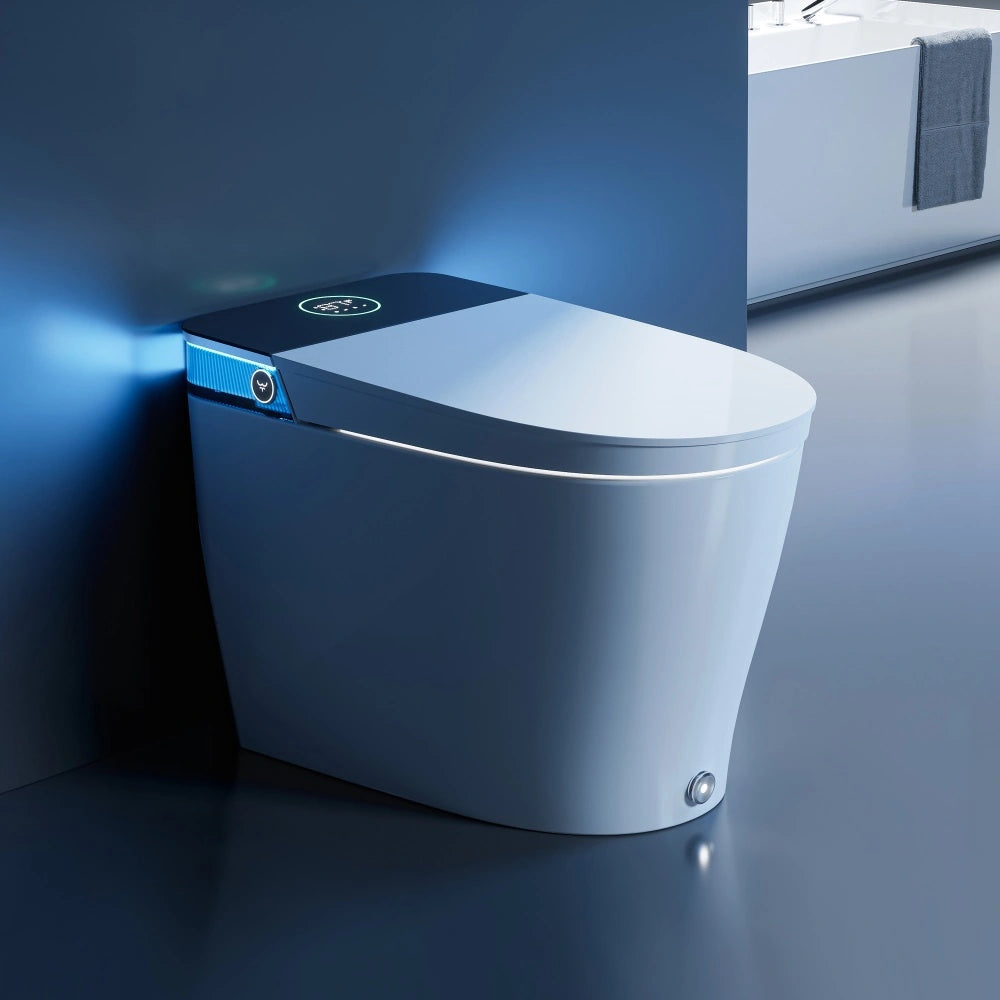
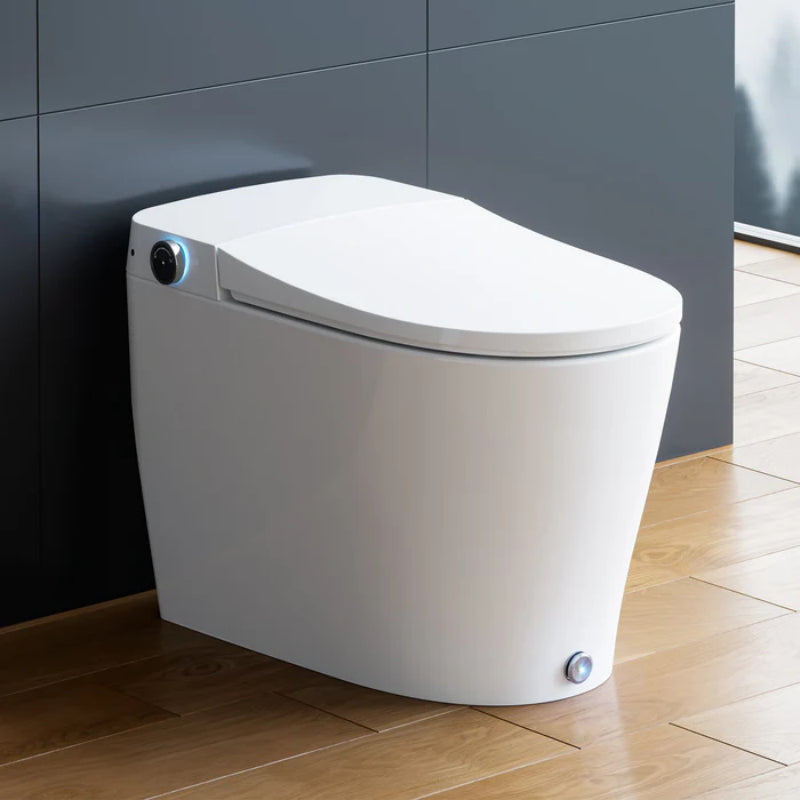
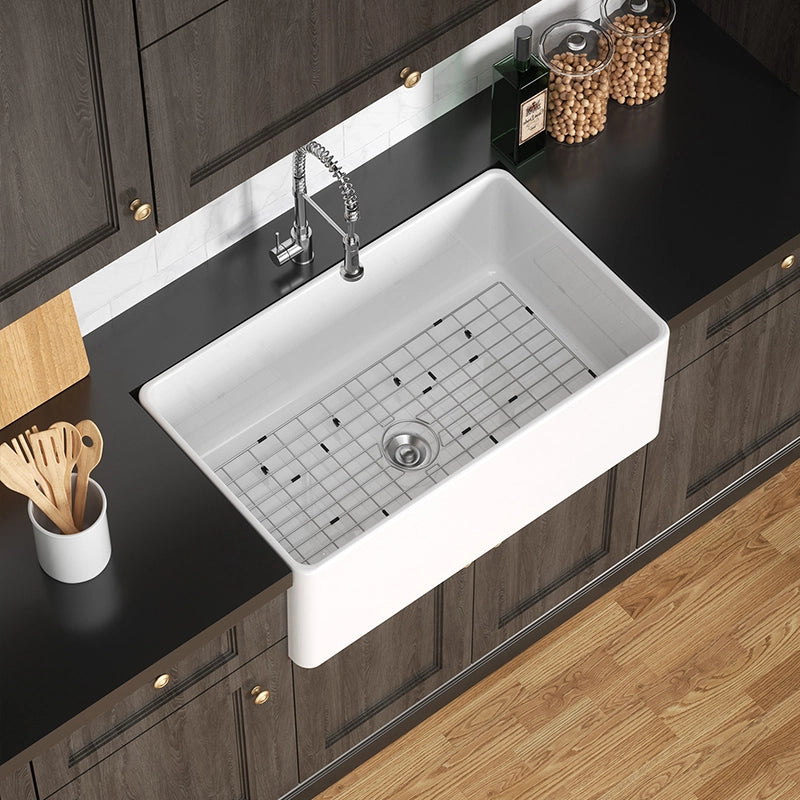

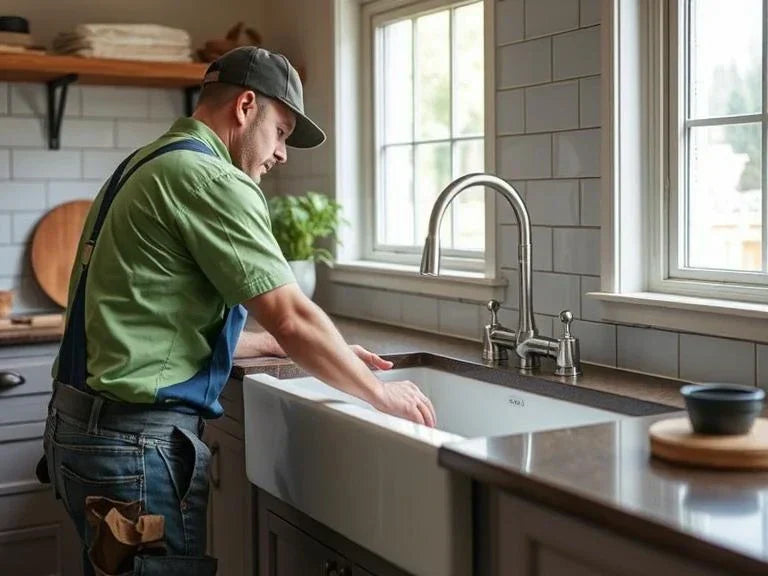
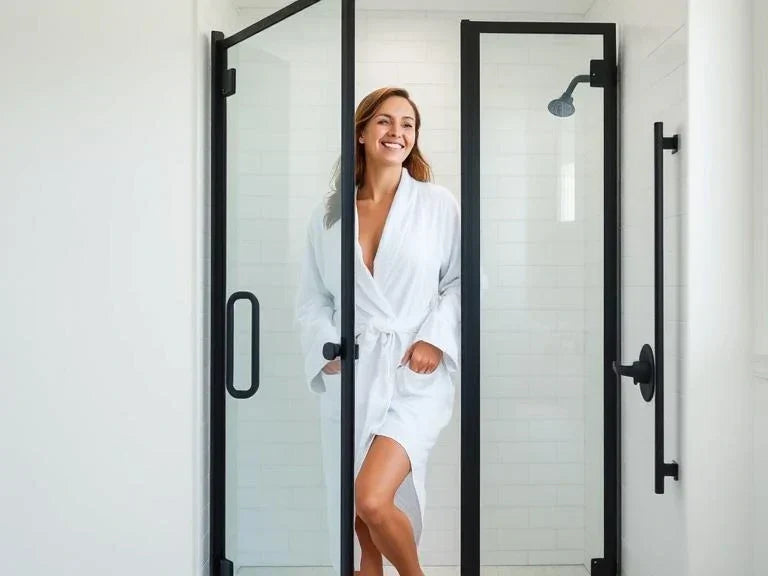

Leave a comment
This site is protected by hCaptcha and the hCaptcha Privacy Policy and Terms of Service apply.